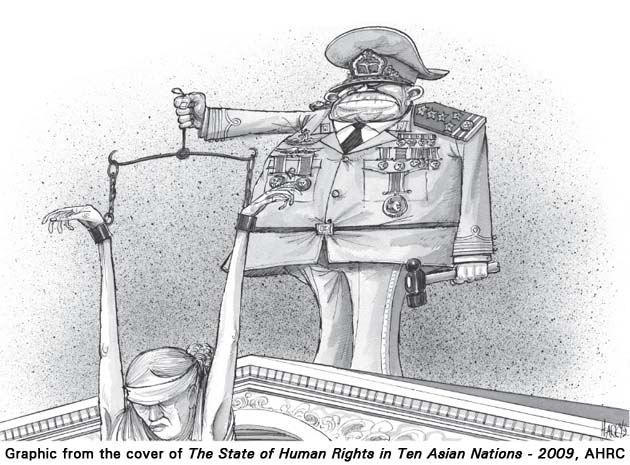
The Asian Human Rights Commission (AHRC) today published its 25-page report containing its analyses on what it has observed as the irreparable ‘social and systemic impact’ of the ongoing violations of human rights in the country. The government remains incapable of providing the most rudimentary forms of protection to its people despite the growing intolerance of the public towards human rights violations. On the other hand the improvements in the legal framework to protect rights, has created the situation where despite the laws being in place to protect the citizens they resort to an emerging ‘parallel system’ from which they now seek remedies and redress.
The ongoing phenomenon of extrajudicial killings and enforced disappearances, with the government admitting to the poor record of convictions, raises a serious question as to whether the country’s justice system is capable of ensuring the protection of rights. While there remains the shared perception in the notion of justice and democratic space victims are rapidly losing confidence in the institutions of justice. They no long see the importance of registering complaints. For the possibility of a remedy to be obtained, ‘complainants’ and their ‘complaints’ are two indispensable elements in order that the process of seeking justice, remedies and redress could take its course. However, due to the government’s failure to, for example, ensure those responsible for killings and disappearance are held to account, the importance of investigations, prosecution and the adjudication of cases in court, has been severely questioned by victims and their families in recent times.
Here, police investigations, because of its flaws, themselves becomes the obstacle in seeking possibilities of remedies and redress; the prosecution, because of its apparent vulnerability to political control and public pressure, becomes a political tool rather than a method of pursuing the violations of victims’ rights; and the court, because of its failure to ensure cases are resolved promptly, has become complicit in the deprivation of the possibilities of remedies. As a result, when the complainants file their complaints they do so without the expectation that it will result into something. This increasing absence of confidence in the system of justice: the police, the prosecutors and the courts, has resulted in victims resorting to a ‘parallel system’. Here, the report observes the phenomenon of ‘remedy by publicity’.
By way of remedy by publicity, possibilities of remedies or redress are there depending on how the victims or their families apply pressure to influence public opinion for the government to take action in their favour. Witnesses or complainants at risk now prefer to expose their risk to journalists, rather than to the police for them to investigate and to provide protection; torture victims who are illegally detained, tortured and falsely charged would rather employ public pressure for their release than legal action.
In some parts of the country, particularly in conflict areas such as Mindanao, the military has virtually assumed civilian police powers and these go unchallenged. In these areas, the notion of civilian policing, civilian power above the military and due process hardly operates because of the military’s complete disregard to due process and legality. This practice has since become commonplace to the point where it obscures what is legal and what is illegal. Also, the military establishment has been intruding into the civilian’s way of life unchallenged, on the pretext of terrorism and insurgency.
It explains the practice of soldiers inspecting people before they board public buses, in entering commercial establishments and conducting operations, not in conflict areas, but in the urban areas heavily populated by civilians. However, the tolerance, by way of agreement and memorandums, by local elected officials, has justified the ongoing intrusion of the military establishment into the people’s civilian life.
Thus, this practice has also obscured who are the police and not the police. The military establishment, by the day, has obtained a certain legal or a de facto legitimacy in their practice of routinely arresting, detaining, torturing and investigating persons under duress, with complete disregard to rules of criminal procedures. The courts tolerance of their practice has also cemented the military’s authority and control over, not only of the police, but also of the ordinary way of life of the Filipinos.
The AHRC has observed this is probably because; firstly, this practice has become heavily embedded as a social norm--meaning, there is nothing new in it. Also the widespread arbitrariness and disregard to elementary due process and legality that protects the rights is lacking if not completely absent. There must be a substantive discourse on the irreparable impact of how the flawed country’s system of justice operates to this day.
The AHRC therefore urges a discourse on the protection of rights by examining how the country’s system of justice actually functions when compared to how it should function. The discussion should be more than a mere description of the violations but rather raise questions as to why these violations are taking place.

 Home | Aims and Objectives of Solidarity Philippines Australia Network | About Kasama
Home | Aims and Objectives of Solidarity Philippines Australia Network | About Kasama 
Search the SPAN Web